Written by Jenn Hand, Holistic Nutritionist, Board Certified Health Coach, NBC-HWC
Ever wonder about those people who just go through their lives, not worrying about what they’re eating?
They’re the “normal” eaters; the ones who just eat when they’re hungry and stop when they’re full. If you struggle with obsessing over eating, here’s how to stop thinking of food and what to do instead!
When I was in high school, I had a close friend who was naturally thin and didn’t have any eating “issues” like I had. Debbie was tall, slender and ate like…well, a normal person!
I was desperately struggling with weeks of bingeing, followed by weeks of restriction, so I looked to Debbie for inspiration.
How did she eat? What were her behaviors around food? I studied her closely. When our group of friends hung out, she would indulge in whatever we all had: chicken fingers and pizza, cookies and chips. (<–how high schoolers eat 😉 )
The difference was that she didn’t eat a lot of anything.
If we had a pasta party for track (the night before the event, the team gets together to “carb load”, a sports tradition), she wouldn’t only eat garlic bread, spaghetti and cookies. She had some salad, some veggies, and a variety of the food that was offered.
And because she was a close friend, I knew she didn’t THINK about food all day the way I did. She ate at the pasta party and didn’t give it another thought after the evening ended.
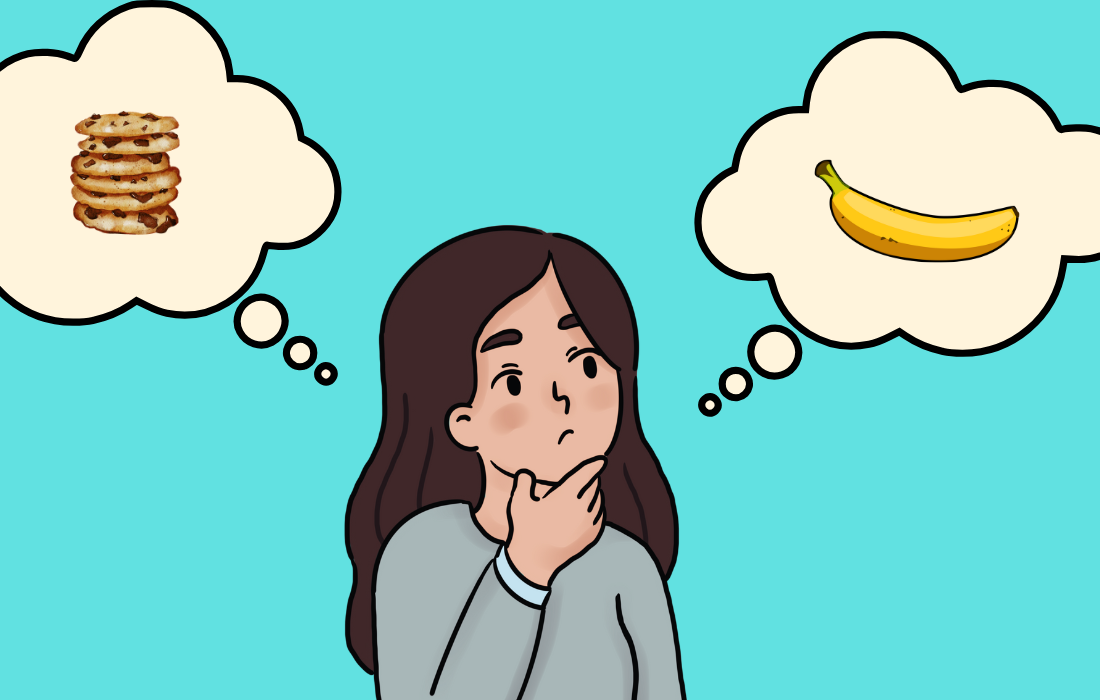
Me on the other hand? I agonized over how to “save up my calories” leading up to the pasta party, fretted over what to eat when I got there, and hated myself for eating too much post-party.
Whereas she didn’t think about food at all, I spent all of my waking hours worrying and obsessing over what to eat or not eat.
Over the years, I studied “normal” eaters. I learned how they approached food and how they developed a very non-chalant attitude towards what they ate or didn’t.
From my own experience healing my food issues and working with thousands of other women for the last 9 years, here’s how to stop thinking of food and what to do instead:
If you prefer to listen to the podcast, do so here:
1. Make Sure You’re Actually Eating Enough
One of the reasons we think about food is when our bodies actually NEED to eat!
When we’re trying to control our food (or looking to lose weight), we often don’t eat enough. Those sneaky diet tapes in our mind think it’s better to eat as little as we can and go as long as we can without eating. We may try to be “really good” and not have an afternoon snack, but then arrive famished to dinner (and end up overeating).
I did a post on what I eat in a day and many people emailed me to say they were surprised and how MUCH I ate.
And my old diet brain says that too. 🙂 But that’s where my hunger was and I was honoring my body. Our minds very easily can tell us “no, you shouldn’t be hungry” or “no, you don’t need that snack”, when in reality our bodies actually need fuel!
Pay attention to how much you’re eating and make sure the sneaky diet mindset isn’t dictating what you eat. 🙂

Our minds very easily can tell us “no, you shouldn’t be hungry” or “no, you don’t need that snack”, when in reality our bodies actually need fuel!
2. Add Protein Every Time You Eat
One helpful tip to ensure your body is balanced is to add protein to every meal and snack.
Adding in protein (any kind: lean meat and poultry, dairy, vegetarian protein, beans and legumes, protein powders, etc) helps you digest your food more slowly and reduces cravings. Protein is what enables your body to regulate your blood sugar (it prevents a quick spike and crash when you just eat a simple carb) and then helps you feel more even-keeled.
You can experiment with different proteins and see how they impact your hunger/satiation levels.
I still notice that when I eat more protein (i.e. eggs and toast for breakfast vs a bagel with butter), I’m way less cranky, can last longer without another meal, and feel much more balanced.
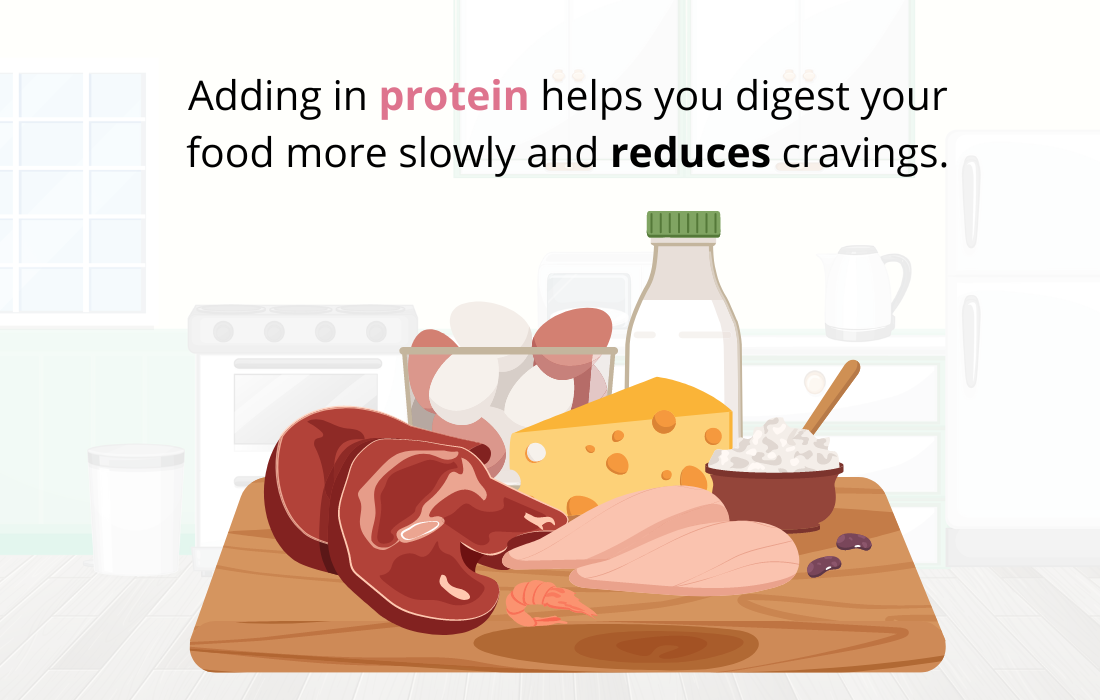
3. Aim for Satisfaction
This is the cardinal sin when you’re in the diet world.
Being satisfied with what you eat is non-existent (you follow a plan or regime no matter what it tells you to eat) and is almost blasphemy. I did a talk a few years ago at a gym and I remember many of the people in the audience were so perplexed at this concept. They didn’t understand why it was so important.
When you’re satisfied with what you’re eating, you can leave the table and not think about food again until you eat next.
But when we eat according to rules and strict do’s/don’ts, we are eating from our minds, not our bodies. (And usually we aren’t very satisfied). When you eat things you like, it’s a game changer.
I did a retreat a few years ago and one of the women said to me, ” I have no idea what I like to eat. I’ve spent my whole life following rules, I literally don’t know what I want”.
This is normal when we’ve spent a long time NOT knowing what we find satisfying.
Explore this concept to see what you find satisfying. Some questions to help:
- What do you like eating?
- What feels energizing to your body?
- If you didn’t have a rule about what to eat for this meal, what would you pick?
- What do I find satisfying? (And if that word doesn’t resonate–explore nourishing, nutritious, enjoyable, energizing, etc!)

When you’re satisfied with what you’re eating, you can leave the table and not think about food again until you eat next.
4. Explore the Secret Diet Mentality
Often times we think we’re being “really healthy”, when in fact, we’re restricting or eating too much from a rule based mentality.
The mind is a sneaky little devil. 🙂 When we restrict in any way, our bodies always end up overcompensating (we overeat, binge or end up eating more, later). I still find this naturally in my life: when I’m sick and don’t eat much, my appetite comes back like a lion when I’m better.
When I’ve been busy with a day or outside on a weekend and don’t eat as much, I find I’m extra hungry later in the day. It’s just our bodies balancing themselves out.
So if we restrict on purpose (or because we have that sneaky diet mindset embedded in our brains), it can make us think about food MORE than we normally would. Explore what rules you’re following or where your mind is telling you to eat less. This helps bring awareness so we can soften and release those rules.🙂
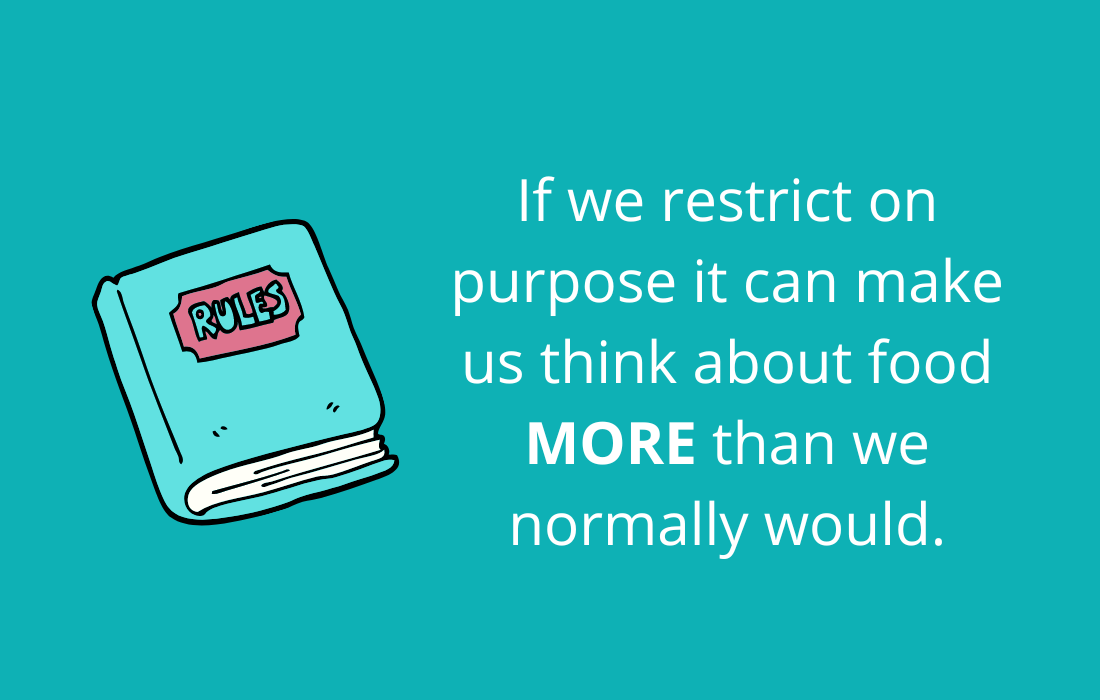
5. Bring Yourself More Towards the Middle of the Pendulum
One of my favorite analogies on this path is the concept of a pendulum.
When you’re dieting (using willpower, restricting, being super disciplined) you’re on one side. It’s too much effort to keep it there, so it swings to the other side (overeating or bingeing). Once we are there, we want to reign it back in by swinging it again to the dieting side.
But this is where the breakthrough can happen!
If we work to move towards that middle instead of going back on a diet (where we’re working on finding our “normal”), it leads to less and less obsessing over food. The middle can be scary, as it’s unfamiliar and new.
But this is where the magic happens–by continuing to work to find the “middle” (where you’re not swinging in between the extremes), food starts to become a lesser part of your day (instead of the entire focus).
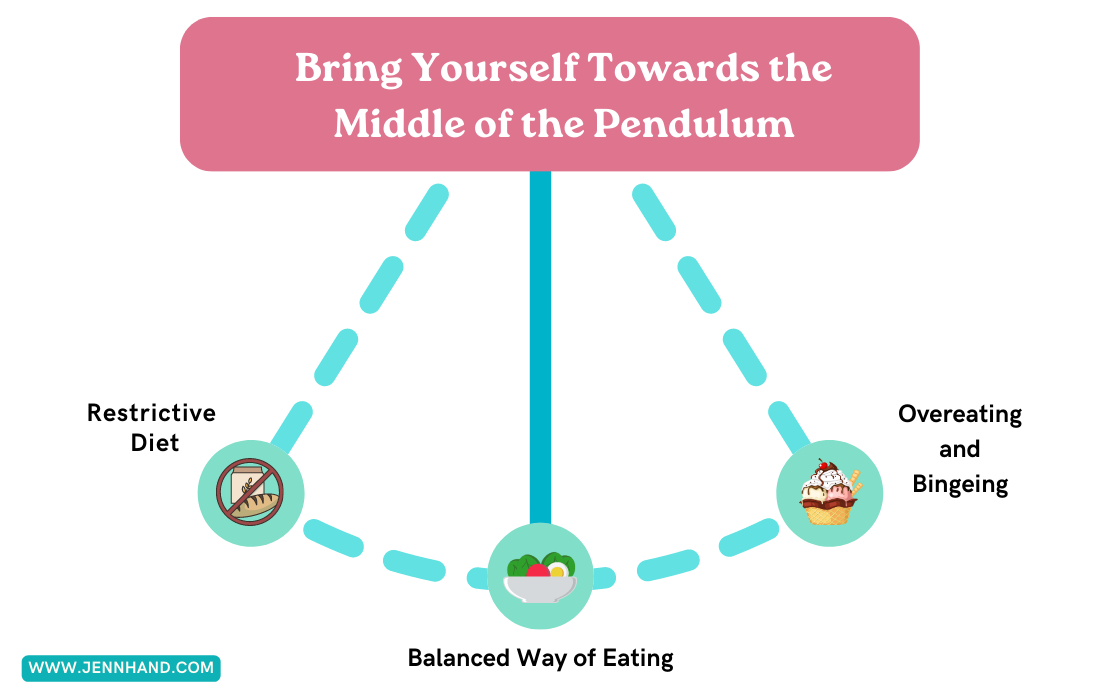
Always Thinking about Food Can Lead to Emotional Eating and Bingeing
One last note to explore…
Can you think about food, but in a different way? When we’re always obsessing and worrying, that can lead to emotional eating and bingeing. But when we think about food in a way that is a gentle exploration, it can be very helpful.
For example, you can “think” about how much you need to plan your meals for the week.
That helps you plan trips to the grocery store so you don’t end up with nothing to eat after work. You can think about how to approach food when you go away for the weekend. This helps you prepare snacks or look ahead at restaurant options.
You can “think” about food in a way that helps you take care of yourself and your body in a loving, kind way.
More Articles About Emotional Eating
⚪ How to Get Off the Diet Roller Coaster
⚪ 7 Myths of Weight Loss
⚪ If You’re Not Dieting, How Will You Lose Weight?
Get the Normal Eater’s Newsletter
Join 8000+ women who are overcoming overeating, binge eating, and breaking up with dieting forever. Get Jenn’s inspiring and actionable weekly newsletter with the latest posts, podcasts, and tips on how to love your body, find food freedom, and lose weight holistically.
Get the Normal Eater’s Newsletter
Work with an Emotional Eating & Holistic Nutrition Coach
Overcome Bingeing and Emotional Eating, and Break Up with Yo-yo Dieting
Working with an emotional eating coach and holistic nutritionist can help you get free from the frustrating binge and restrict cycle and stop yo-yo dieting.
You don’t have to be obsessed with food or have a million rules around eating to find your natural weight and learn to love your body. Ready to actually see a lasting change and experience true freedom?
Click here to schedule a 20-minute introductory coaching call.
About the Author:
Jenn Hand has been helping women like you become normal eaters since 2015.
She’s worked with thousands of women, helping them to balance their bodies, end bingeing, stop obsessing over food, and start feeling amazing again. As a board-certified health coach and holistic nutritionist, Jenn knows how to support you in making real positive changes that last.
Her articles have been published on Mind Body Green, Tiny Buddha, Thrive Global and other local and global media platforms. She’s the author of How to Be a Normal Eater and the creator of The Normal Eater’s Club program. Listen to Jenn’s advice and tips on the Cake Doesn’t Count Podcast, or read more of her articles for free on the Food Freedom Blog.
Learn more about private coaching with Jenn here >

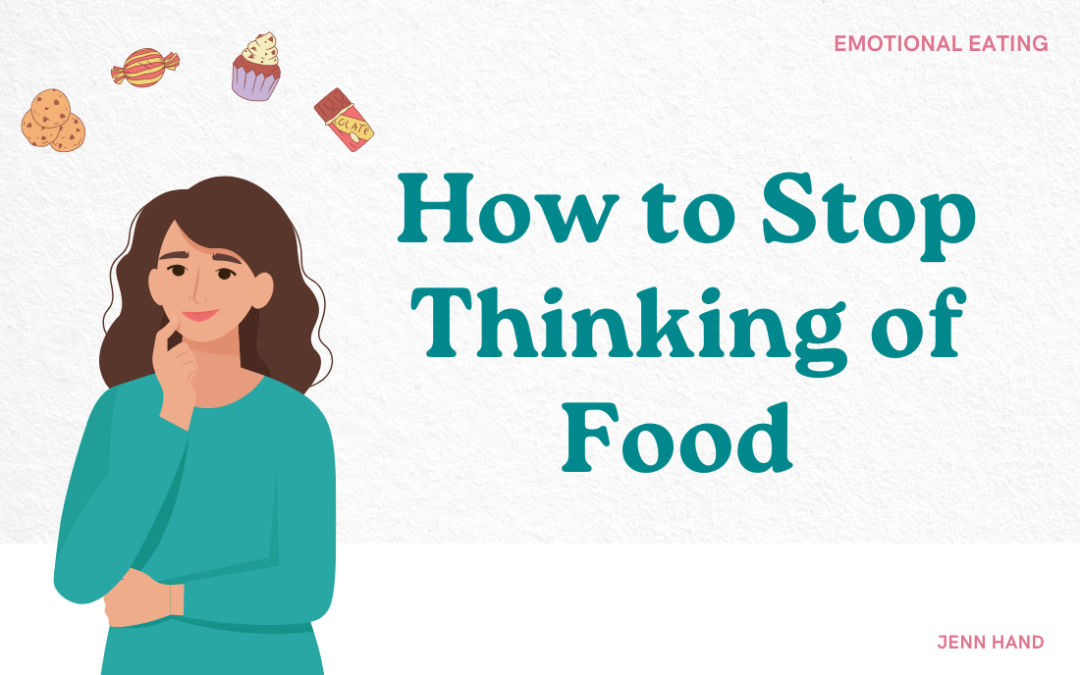
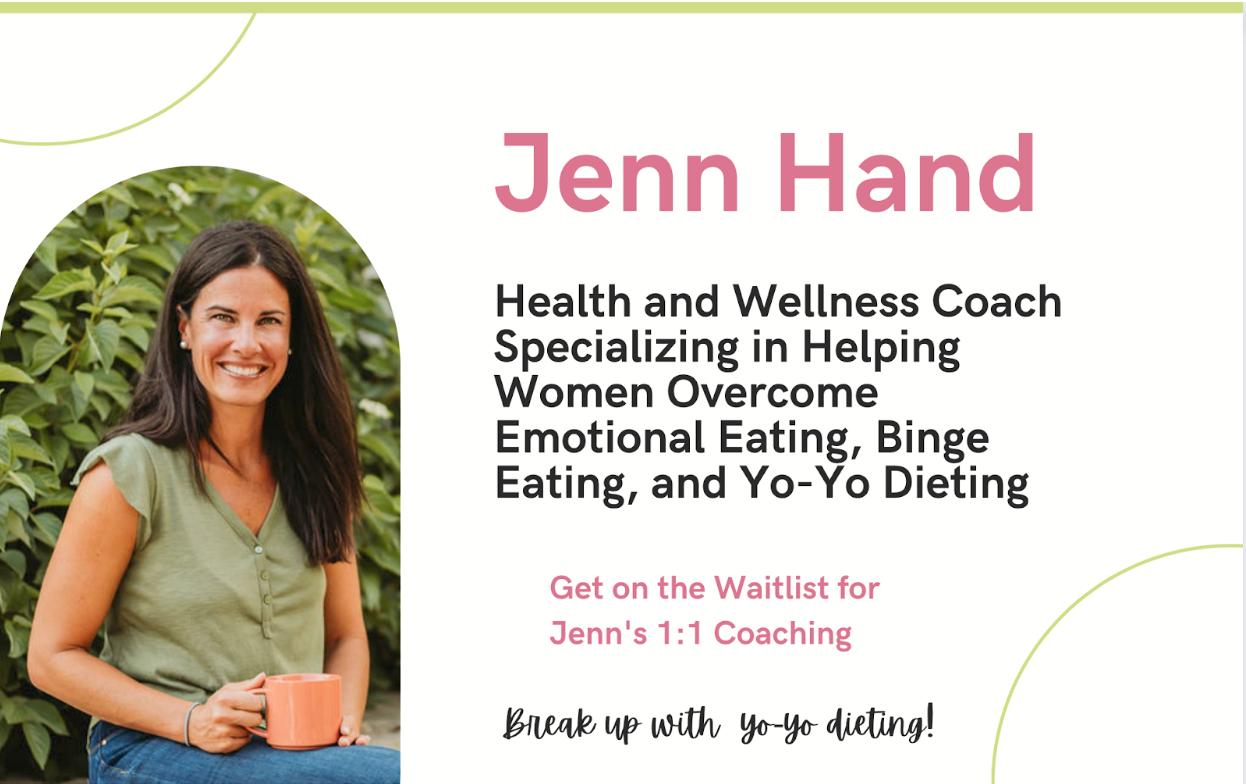




Hi Jenn
Wow!!! Thank you so much for these amazing tips. I’ll definitely try and work towards the middle ground, as I’m so guilty of swinging in between the two extremes.
You are most welcome! The middle is the magic! 😉
This was so helpful Jenn! Every day I’m working toward being in the middle of that pendulum and just eating normally! Thanks for all you do to help us!
You’re so welcome 🙂 I love picturing the pendulum–I think it can be so helpful to visualize what you’re aiming for!